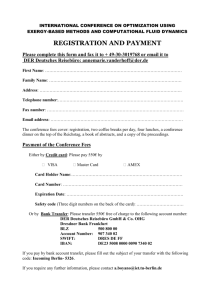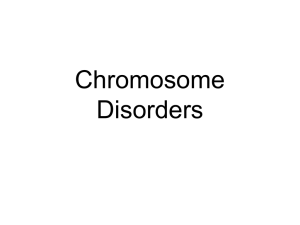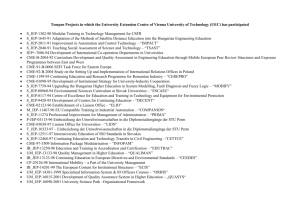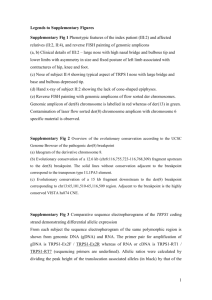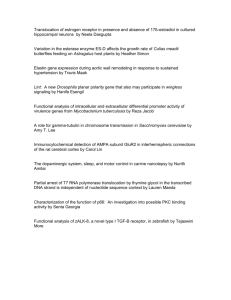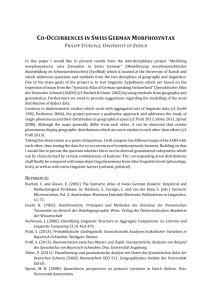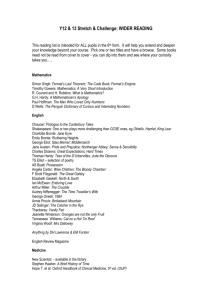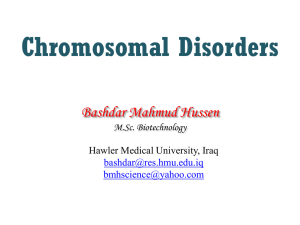structural aberrations
advertisement
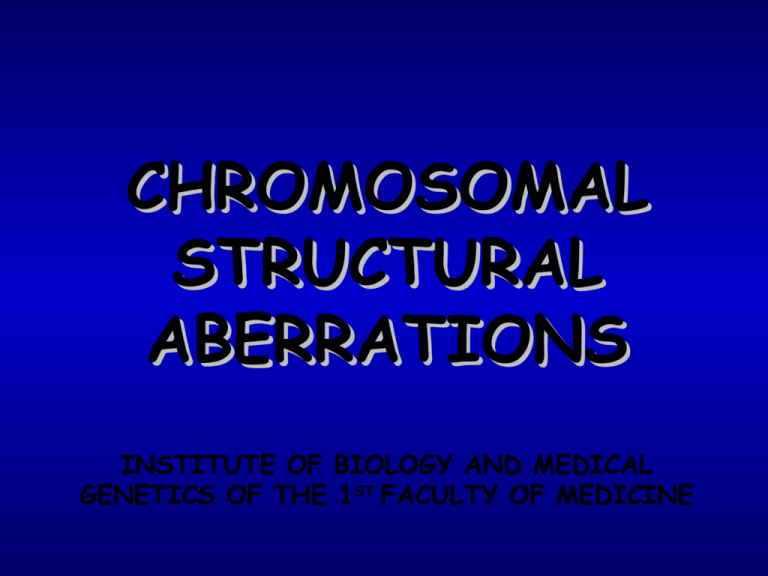
CHROMOSOMAL STRUCTURAL ABERRATIONS INSTITUTE OF BIOLOGY AND MEDICAL GENETICS OF THE 1ST FACULTY OF MEDICINE CHROMOSOMAL ABERRATIONS ► NUMERICAL ► STRUCTURAL BALANCED UNBALANCED ► MIXOPLOIDY • MOSAICISM • CHIMERISM STRUCTURAL CHROMOSOME REARRANGEMENTS BALANCED UNBALANCED: (PHENOTYPICALLY HARMLESS): DELETION INVERSION TRANSLOCATION INSERTION DUPLICATION ISOCHROMOSOME RING CHROMOSOME DICENTRIC CHROMOSOME DELETION INTERSTITIAL DELETION TERMINAL INVERSION PARACENTRIC Balanced rearrangement Reduced fertility – recurrent miscarriages (gametes - acentric or dicentric chromosomes after cross-over in meiosis) INVERSION PERICENTRIC Carriers – normal phenotype Risk of producing unbalanced gametes due to cross-over and having affected children (partial trisomy and partial monosomy) PERICENTRIC INVERSION PRODUCING UNBALANCED GAMETES PART. TRISOMY PART. MONOSOMY PART. TRISOMY PART. MONOSOMY RING CHROMOSOME ISOCHROMOSOME TRANSLOCATION RECIPROCAL TRANSLOCATION ROBERTSONIAN (CENTRIC FUSION) INTERNATIONAL CYTOGENETIC NOMENCLATURE ISCN – 1995, 2005 (examples of symbols and abbreviations) Normal human karyotype: 46, XX or 46, XY Numerical aberrations: 47, XXY; 45, X; 69, XXY +/- placed before additional or missing chromosome 47, XX, +21 Structural aberrations: del - deletion 46, XY, del(5)(p?) t - translocation (reciprocal) 46, X, del(X)(q?) 46, XY, t(2;8)(p?;q?) der, rob - derivative chromosome (Robertsonian translocation) 45, XX, der(14;21) n. 45, XX, rob(14;21) 46, XY, der(21;21), +21 n. 46, XY, rob(21;21), +21 TURNER SYNDROME DELETION FORM 46,X,del(Xp) CRI DU CHAT SYNDROME (CAT CRY SYNDROME) • microcephaly • severe somatic and mental retardation • round „moon-shaped“ face (in childhood) • hypoplastic larynx – high shrill cry (like a mewing cat) del(5p) PRADER-WILLI SYNDROME del(15)(q11-13)pat NEWBORNS, EARLY INFANTS: • severe hypotonia • developmental delay LATER: • mental retardation • overeating – extreme obesity with complications (DM, cardiovascular disorders, sleeplessness,…) • hypogenitalism • behavioral disorders ANGELMAN SYNDROME del(15)(q11-13)mat • severe mental retardation • absent speech • paroxysms of easily provoked laughter • jerky movements, ataxia, stifflegged gait • epileptic seizures • „happy puppet“ syndrome DOWN SYNDROME TRANSLOCATION FORM M. DOWN: 95% free trisomy of chr. 21 4-5% translocation form (Robertsonian translocation) <1% mosaicism DOWN SYNDROME TRANSLOCATION FORM 46,XY,der(14;21),+214 Analyse the karyotype of a newborn with Down syndrome features (task 17, p. 89): Down syndrome 46,XX,der(21;21),+21 Risk: in theory 100%, empirical 100% 21 GAMETE (II. parent) 46,XX LETHAL 21 45,XX(XY),-21 (MONOSOMY) 21 21 21 45,XY,der(21;21) MEIOSIS 21 GAMETE (I. parent) 21 21 21 ZYGOTE (FETUS) M.DOWN 46,XX(XY),der(21;21),+21 (TRISOMY) PHENOTYPE KARYOTYPE Analyse the karyotype of a man - father of Down syndrome child, mother - 46,XX (task 16, p. 88): Balanced translocation 45,XY,der(14;21) - father 46,XX(XY),der(14;21),+21 – M. Down child 45,XY,der(14;21) 21 14 21 21 14 14 21 14 14 21 21 14 14 14 21 46,XX NORMAL M.DOWN 33,3% BALANCED TRANSLOCATION LETHAL 21 MORBUS DOWN PROBAND PARENTS RISK 47,XX/Y,+21 46,X /Y 46,XX/Y 46,XX/Y,der(21;21),+21 45,XX/Y ,der(21;21) 46,XX/Y X 46,XX/Y,der(D;21),+21 45,XX/Y ,der(D;21) 46,XX/Y+21,der(21;22) 45,XX/Y ,der(21;22) 46,XX/Y,der(D;21),+21 46,XX/Y,+21,der(21;G) 47,XX/Y,+21 46,XX/Y 47,XX/Y,+21/46,XX/Y > THAN POPULATION dependence on maternal age 100% THEORETICAL 100% EMPIRICAL 46,XX/Y 33,3% THEORETICAL EMPIRICAL: cca 5% - father (carrier) cca 15% - mother (carrier) 46,XX/Y NEW MUTATION NONPATERNITY 46,XX/Y MOSAICISM – depends on ratio of the cell lines with normal and aberrant number of chromosome 21 Analyse the karyotype of a girl with severe mental and somatic retardation: Cri du chat syndrome 46,XX,del(5p)
